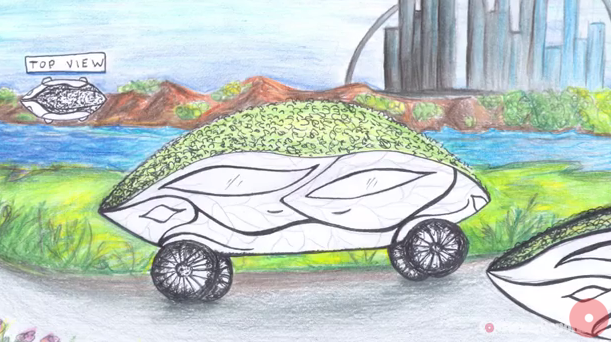Kids’ Concepts For Fuel-Efficient Cars Aren’t Beyond Belief
Maybe your childhood dream of a city skyline filled with jet-packing commuters and hovering taxicabs is still a fantasy, but some kids have ideas for fuel-efficient cars that are simultaneously ahead of their times but not beyond the realm of possibility.
From plant-covered vehicles that run on photosynthesis to those that run on air compression or solar panels the participants at Disney’s Create Tomorrowland XPRIZE Challenge came up with inventive futuristic fuel-efficient ideas for how we’ll be getting from one place to another in the future.
Our colleagues in Consumer Reports’ auto testing division reviewed some of the kids’ creations, and while many of them might seem far-flung at first glance, some included components already in use today.
Katrina’s creation uses natural photosynthesis.
“In the future we harness that power and drive,” the 14-year-old says. “There’s no bad waste product, the only waste is oxygen and that actually helps plants.”
Amos Winter, a mechanical engineer professor for MIT, tells CR’s Jake Fisher that Katrina’s definitely onto something with her design.
“The idea of growing fuel with biodiesel that they have in algae, which uses photosynthesis to produce oil, people are working on that,” he says.
Lila, 11, created a vehicle closer to our own past visions: a flying car. In her design, the vehicle is like a plane, but smaller and with three rows of seats.
Winter noted that there are already some companies working on such vehicles. The extra seats are also a good idea, he said, because you’d want as many people in the flying car as possible.
“A four person sedan going 50 miles per hour burns more fuel per person per mile than a 747 going 10-times faster at 500 miles per hour,” he said.
Thirteen-year-old Jason created an electric scooter that includes an engine, not a battery.
“It works by taking water and converting it to hydrogen through electrolysis,” he says. “Then it goes into the engine that burns it and converts it into rotary motion.”
In all, Amos and Fisher said the children’s designs were creative, thoughtful, and show they care about the future of not only vehicles but the environment.
“When you look at someone who’s 10- or 13-years-old, those kids want an environment around when they’re 90, and with the prospect of things like climate change it’s pretty scary for a 13-year-old,” Fisher says.
For more designs from Disney’s Create Tomorrowland XPRIZE Challenge check out Consumer Reports.
Want more consumer news? Visit our parent organization, Consumer Reports, for the latest on scams, recalls, and other consumer issues.



